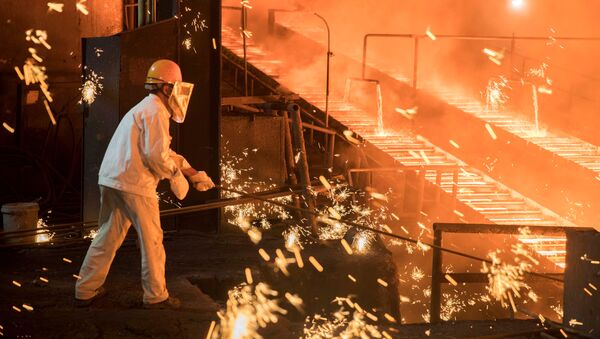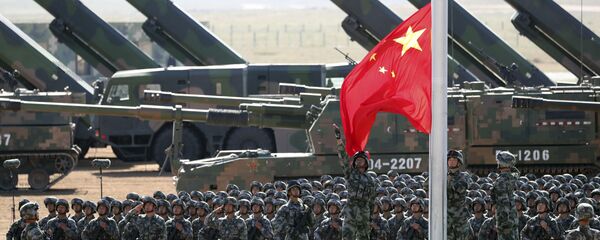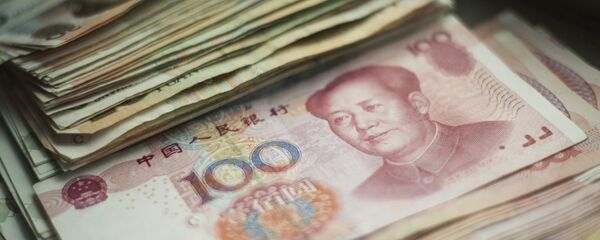Kristian Rouz —Profits from China's industrial enterprises slowed for the fifth consecutive month in September as many companies are facing declining overseas demand for their products.
The so-called "trade war" with the US appears to be only part of the problem, as the ongoing fragmentation of the global consumer market has contributed to a broader slowdown in Chinese exports. Additionally, China's domestic demand for manufactured goods has also eased, despite the central government's effort to support the internal consumer market.
READ MORE: Exploring the Origins of the Myth That 'the US Rebuilt China' in Past Decades
According to a report from the National Statistics Bureau (NBS), China's industrial earnings increased 4.1 percent year-on-year in September. This, compared to 9.2-percent growth in the previous month, is the weakest pace of expansion since February 2016.
Total earnings for September came in at $78.6 billion.
"In the first nine months, 34 of 41 industrial sectors saw profit rising year-on-year," NBS said in a statement.
NBS said industrial profits have come under pressure in the face of elevated trade tensions with the US, as Chinese companies' sales in the American market have been hampered by US President Donald Trump's 10-to-25-percent tariffs on Chinese products.
"Unanimously, what businesses there are worried about is the uncertainty of the trade war. If there was no trade war, Chinese companies would be far more optimistic about 2019," Vinesh Motwani of Silk Road Research said.
At the same time, Chinese officials said, the output of Chinese manufacturers has also decreased amid a combination of higher input costs and slower price growth. Additionally, the so-called "base effect" has contributed to this statistical slowdown, due to elevated Chinese industrial profits from last year.
READ MORE: China to Hold Crucial Meeting with Indian Exporters to Increase Shipments
Chinese manufacturers are facing downward pressure on investment as well, as the nation's lenders have recently limited their loan issuance despite the People's Bank of China's (PBOC) efforts to loosen monetary conditions in the country.
China's commercial banks are increasingly inclined to keep cash in reserves in order to be prepared for possible economic shocks — and such strategies have prompted many companies to put their investment plans on hold.
"(China's) growth has been on the back of an enormous supply of credit emanating from the government banks directed by the Communist Party to feed credit to the provinces and companies, particularly the state-owned companies," Mark Mobius, former fund manager for Franklin Templeton said.
Additionally, the turbulence on China's stock market has contributed to the mounting risks of disinvestment.
Chinese markets are down roughly 30 percent for the year due to international headwinds. Meanwhile, some $620 billion worth of Chinese shares have been "pledged" to loans, meaning over the past few years, many companies have issued new stock to secure their credit lines. In light of this, lower stock values are limiting the borrowing prospects for many Chinese companies.
However, some economists are still optimistic about China's economic prospects. Although the International Monetary Fund (IMF) has lowered its growth forecast for the mainland to 6.2 percent in 2019, China's slowdown does not appear to be catastrophic.
"There really is no major problem with the Chinese economy in terms of its growth path," Mobius said. "The country is still growing at a rapid pace."
NBS is forecasting China's economic growth will amount at 6.5 percent next year — an outlook slightly more optimistic than the IMF's, as it takes into account Beijing's ongoing economic reforms aimed at boosting economic activity.
READ MORE: Aftershocks of Crisis in Asia Will be Felt by China's Economic Partners — Prof
However, uncertainty still lingers, and China is actively seeking new trade and investment deals outside of its relationships with the US and the Eurozone.
These efforts are best exemplified by the China-Japan forum in Beijing with a focus on economic cooperation. Another example is Beijing's rapid build-up in investment into the rest of Asia and even Africa — in hopes of lucrative returns.




